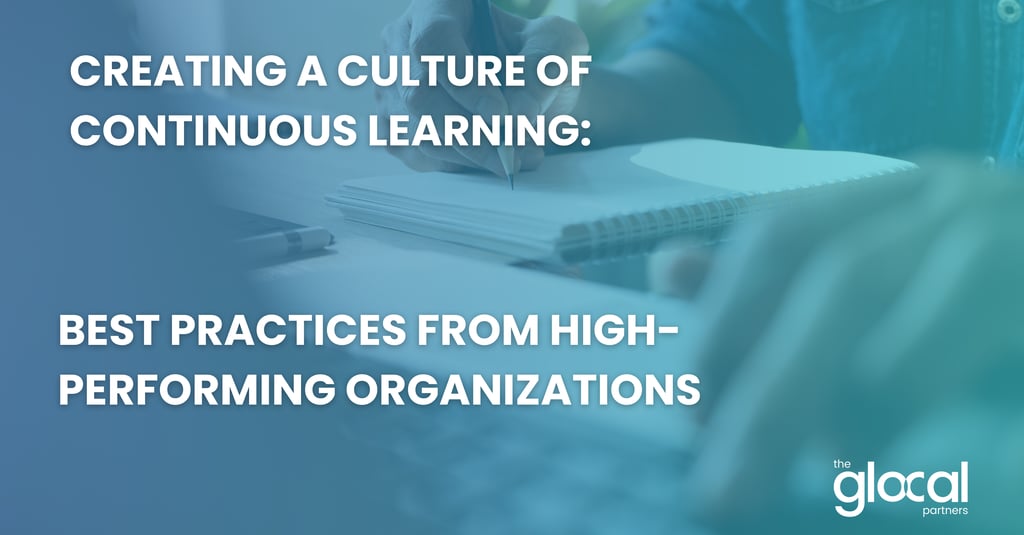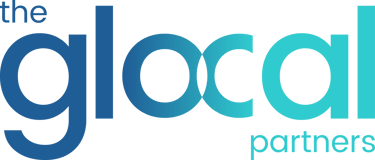Creating a Culture of Continuous Learning
Best Practices from High-Performing Organizations
The Glocal Partners
6/24/20252 min read


The development of a robust learning culture has transitioned from a nice-to-have organizational attribute to a mission-critical capability such as market volatility, technology acceleration, and talent expectations demand unprecedented organizational adaptability and innovation velocity.
Key Challenges in Building Learning Cultures:
Time Allocation Constraints -- According to Bersin & Associates' Corporate Learning Factbook (2023), 68% of employees cite "lack of time" as the primary barrier to learning, with the average knowledge worker having just 24 minutes weekly for dedicated development activities despite stated organizational priorities.
Leadership Behavior Inconsistency -- The Harvard Business School's Learning Organization Study (2022) found that 75% of executives verbally champion learning while only 31% model continuous development behaviors or allocate resources that align with their rhetoric, creating credibility gaps.
Short-Term Performance Pressure -- PwC's Organizational Culture Survey (2023) reveals that 81% of companies maintain performance management systems that prioritize immediate results over long-term capability building, inadvertently discouraging learning investments.
Knowledge-Sharing Barriers -- The Institute for Corporate Productivity's Knowledge Management Benchmark (2022) indicates that 63% of organizations lack effective systems for documenting and sharing institutional knowledge, with structural, technological, and cultural obstacles preventing collaborative learning.
Strategic Solutions for Learning Culture Development:
Implement protected learning time policies with dedicated development blocks, learning objectives integrated into work planning, and productivity metrics that account for capability-building activities, as recommended by the Learning & Performance Institute's Continuous Development Framework.
Develop leadership learning accountability systems requiring executive learning plans, visible development activities, and regular knowledge-sharing by senior leaders, following the Center for Creative Leadership's Leadership Learning Cascade Model.
Create integrated performance-learning systems that incorporate capability development into performance goals, recognize learning achievements, and reward knowledge application and sharing, using Deloitte's Performance-Learning Integration Framework.
Establish comprehensive knowledge management ecosystems combining technology platforms, collaborative processes, and cultural incentives that make learning exchange frictionless and rewarding, utilizing the Knowledge Management Institute's Connected Learning Architecture.
Key Takeaway:
According to McKinsey's High-Performance Learning Culture Study (2023), organizations with mature learning cultures demonstrate 92% higher innovation output, 52% stronger talent attraction, 37% better employee engagement, and 25% higher productivity compared to companies with weak learning environments. Most significantly, these organizations navigate market transitions 4.2 times more effectively, repositioning their capabilities ahead of disruption rather than in reaction to it, yielding a 34% profit premium during periods of significant market change.
Book a Free Session with The Glocal Partners to discuss more details!
References:
Bersin & Associates. (2023). Corporate Learning Factbook. https://www.bersin.com/corporate-learning-factbook-2023
Harvard Business School. (2022). Learning Organization Study. https://www.hbs.edu/faculty/research/learning-organization-study-2022
PwC. (2023). Organizational Culture Survey. https://www.pwc.com/us/en/services/consulting/organizational-culture-survey-2023
Institute for Corporate Productivity. (2022). Knowledge Management Benchmark. https://www.i4cp.com/research/knowledge-management-benchmark-2022
McKinsey & Company. (2023). High-Performance Learning Culture Study. https://www.mckinsey.com/business-functions/people-and-organizational-performance/our-insights/high-performance-learning-culture-study-2023
theglocals@theglocalpartners.com
© 2026. All rights reserved.
This website is Powered by: The Glocal Partners LLC
